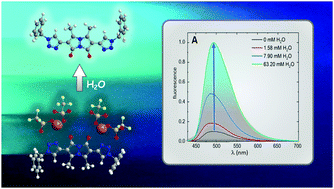A dipodal bimane–ditriazole–diCu(ii) complex serves as an ultrasensitive water sensor†
Abstract
An ultrasensitive fluorescent water sensor based on a dipodal bimane–Cu(II) complex is reported here. This complex, which is non-fluorescent in the absence of water, demonstrates a remarkable turn-on fluorescence in the presence of extremely low (0.000786% v/v) concentrations of water, via highly selective water-induced displacement of copper and restoration of the innate bimane fluorescence.

- This article is part of the themed collection: Host-Guest Chemistry


 Please wait while we load your content...
Please wait while we load your content...